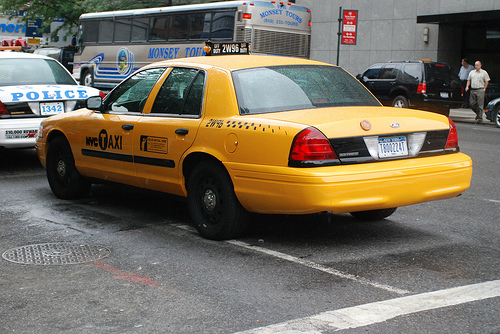Starting in 2007, I got a real urge to travel. I was driving a taxi, and I enjoyed it, but it wasn't something I wanted to do for the rest of my life (and still don't). The taxi company I was working for at the time was on borrowed time, as we were being ejected from the city for various reasons I won't get to in here. So come early summer 2011, I knew it was time for me to get out of the United States and begin exploring. I wasn't wealthy enough I couldn't work, so I needed a job, and teaching English was the perfect solution.

The first issue I needed to tackle was where to go. I knew I wanted to go to Asia, with Thailand and China being the two strongest contenders. Regardless of which country in the world interests you, you need to take visa issues into consideration. Some countries allow you to just come in on a tourist visa. Others require a residency or business visa. The TEFL (Teaching English as a Foreign Language) school I settled on just so happened to be in China.
People ultimately seem to settle on three regions to teach in: Europe, Latin America, or Asia. However, eastern Europe seems to be quite popular as well. Here's the thing about Europe. The better teaching positions (if not all) seem to favor Europeans. You also will almost surely expect to need a college degree, something I don't have. Latin America doesn't require a degree, but the pay tends to be lower as well. Asia tends to be the most popular. From my experience, jobs are plentiful, and easy to find.
Most countries in Asia do require a degree, especially Japan, Korea, and Taiwan, which have the highest paying jobs. Cambodia is perhaps the easiest because no degree is required and once you show up at the airport, you only need to buy a business visa for about $50, and you will have permission to work. As I said, I chose China because of the TEFL school I selected, which wasn't a chain school with locations all across the region.
Now here's the thing about TEFL schools. There are two main types. You can attend a school online which offer different price packages, ranging in price from $250 all the way up to a $1000 or more. The advantage to an online school is that you can attend training on your own time. The disadvantage is that you will not be receiving any actual classroom teaching practice with real students. This is something I consider very important. In some instances, online schools can even help you find a job after graduation.
The other type of TEFL school is one you attend in a regular classroom, ideally in a city or country you'd actually like to teach in. You wouldn't want to attend a school in Mexico and then go teach in Thailand, for example. That's just silly. When you attend an actual training school, you can expect to spend up to 4 weeks learning how to teach English. Most of that time you will be other prospective teachers like yourself. During that time, you will also be put into an actual classroom with real students at an actual school. The advantage here is huge in my opinion. There is nothing like having to be with real students to understand what it's like to be a real teacher. You will get valuable feedback on how to improve. These TEFL schools will almost assuredly help you locate a job after your training is finished.

Regardless of which method you might choose to get your TEFL training, the next step is finding a job. As I stated, your TEFL school can likely help you find a job, but in the off chance they don't, or perhaps you'd like to find a higher paying job yourself, then here's what you can do. You can either look for jobs on the Internet, such as Dave's ESL Cafe or Craigslist (a site I have had great success with). Or you can find them locally via word of mouth. Even within the same city, pay ranges can vary widely, depending on the type of job offered.
From my own experience, there are several types of jobs which you can consider. You can teach at a primary school (which I did upon first starting). You can teach at after school centers (which I have also done). And you can even teach at kindergartens (my personal favorite). Quite honestly, the list of types of places you can teach is too long to discuss here. So I will focus on the three types I mentioned. Primary schools are daytime positions, with no weekends. They also typically offer you a free apartment. The downside is that the pay is lower and you might have a lot of students in each class. Almost too many. When I was teaching 6th graders, I had 35-36 students per class. When I taught high school students, I was bumping up against 50 students or so. After school centers are typically younger students, and because they are after school, you can expect to work nights and weekends. The pay is higher, but you will not receive a place to live from the school. Need to find that on your own. Lastly, kindergartens, which are my personal favorite. The pay is great here too. No apartments are offered, but you will not need to work nights or weekends either (under most circumstances). Because of the setting, your students will range in age from 2 to 6 years. Obviously you would need to enjoy that age range to even consider working there. The nice thing about kindergartens is that you spend all day with the same set of students unlike after school centers or even primary schools. This allows you to form a tighter bond with each student.
I almost forgot to mention that you do not need to know the language of the country you intend to move to. In fact, you shouldn't be speaking anything but English in the classroom. You're trying to create an immersion environment.

Regardless which type of school you decide to work in, you definitely need to try and enjoy yourself. If you're a grumpy sort, this isn't the occupation for you. You should identify which age range you'd think you most enjoy spending time with and then choose where you would lie to work based on that.
Take advantage of your time in the country to do some sightseeing, trying new foods, or even learning a new language. I didn't apply myself as well as I could have in China, but I learned enough Mandarin to be dangerous. I had the opportunity to see the Great Wall, Tiananmen Square, the Shaolin Temple, and more. I even met my wife there. In total, taught from September 2011 until October 2015. Absolutely great experience that I'd highly recommend to anyone so interested.
Thank you for this write up. I have long considered this but still never done it. I wish I had done it earlier in my life. That said, I am at a junction in my life so why not now.....out of interest were you able to save much money?
Downvoting a post can decrease pending rewards and make it less visible. Common reasons:
Submit